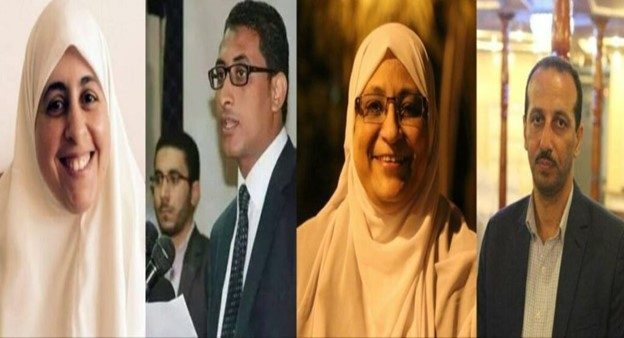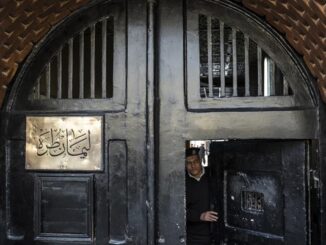
A special Egyptian court on Sunday gave 30 members of the Egyptian Coordination for Rights and Freedoms (ECRF) sentences ranging from five-year to life imprisonment, according to Islam Salama, a lawyer from the Egyptian Initiative for Personal Rights (EIPR).
The Emergency Supreme State Security Criminal Court on Sunday gave unfair imprisonment sentences to staff members of the Egyptian Coordination for Rights and Freedoms (ECRF) on trumped up charges, with four veteran human rights activists given prison terms up to 15 years, including “terrorism” allegations, as several rights groups reported.
Mohammed Abu Horayra, a lawyer, received a 15-year sentence, according to the Egyptian Initiative for Personal Rights (EIPR) and other groups.
The rights groups said his wife Aisha Khairat al-Shater, the daughter of former Muslim Brotherhood (MP) leader Khairat al-Shater, was given 10 years in prison.
Khairat al-Shater was arrested in a crackdown on the Brotherhood after the military led by current President Abdel Fattah al-Sisi ousted president Mohamed Morsi in a coup in 2013.
The late Morsi’s party, Freedom and Justice Party (FJP), affiliated to MB had won national elections, but he was toppled by a coup following protests incited and supported by the military against his one-year rule.
The new military regime subsequently outlawed the Muslim Brotherhood and accused it of “terrorism”.
The Egyptian Initiative for Personal Rights tweeted, saying: Emergency State Security Court Hands Down Sentences Ranging from 15 to 5 years to Defenders at the Egyptian Coordination of Rights and Freedoms (ECRF).
Hoda Abdelmoneim, also a lawyer, received a five-year prison sentence which cannot be appealed, the rights groups said.
In her sixties, Abdelmoneim had been a member of the state’s official National Human Rights Council before being arrested in 2018. She was also a spokesperson for Egypt’s Women Revolutionary Coalition — a group close to the pro-legitimacy front established after the coup.
Ezzat Ghoneim, another lawyer, received a 15-year prison term, the groups said.
All four were part of the Egyptian Coordination for Rights and Freedoms, a non-governmental group which suspended its activities in 2018 when Abdelmoneim, Shater and other activists were arrested.
The court added a five-year probation period at the end of each sentence of those convicted, which includes a travel ban and an order to regularly report to a police station.
Mary Lawlor, the United Nations special rapporteur on human rights defenders, had on Saturday tweeted that she would closely follow the verdict for the four activists.
She said they had been “arbitrarily detained in 2018, forcibly disappeared, tortured & charged in unfair trial with joining a terrorist group.”
Egypt regularly uses accusations of support or financing of “terrorism” to hold activists and opposition figures as long as possible in pre-trial detention.
The two-year time limit on such detention is regularly exceeded, say rights groups who count around 60,000 political prisoners in the country.
Many face brutal conditions in overcrowded cells; and Egypt has long been criticised for its rights record.
On his part, Dr. Helmy El-Gazzar, head of the MB political unit, commented on these unjust rulings, tweeting: “The legal profession is part of the justice system, and imprisoning lawyers means waste of the right of defendants to hire lawyers to help them defend themselves.
The imprisonment of human rights activists is evidence of the regime’s fear of exposing the absurdity of trials and crimes committed against detainees. Egypt imprisons defenders of justice and human rights, and civil society activists.”
In another tweet, he said: “Justice and freedom are foundations on which states are built and regimes stabilized. These arbitrary prison sentences against honorable Egyptians are only because they defend the rights of the Egyptian human.”
Amnesty International and other rights group have decried the arrest of the 14 and said their trial reflected “gross violations of their right to a fair trial.”
Sunday’s verdicts are not subject to appeal and only the country’s president has the authority to pardon or throw out the sentences.
Rights groups have repeatedly criticized mass sentencings, common over the past years in Egypt in trials related to the Brotherhood or dissent, and called on authorities to ensure fair trials.
Egypt’s government has in recent years jailed thousands, mainly Islamists, but also secular activists involved in the 2011 Arab Spring uprising that toppled the country’s longtime autocratic President Hosni Mubarak.



